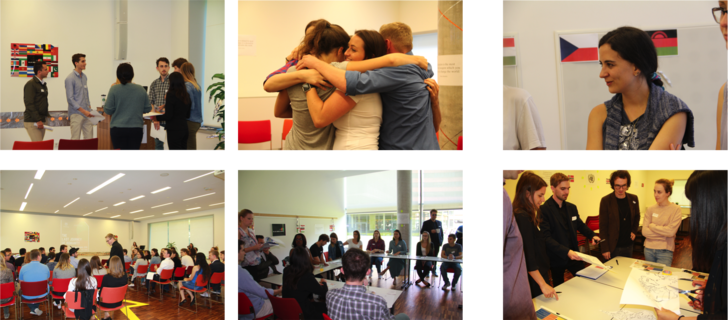Live Action Role Play: Experience Design Teaching through co-creative designing, experiencing and learning. The teaching concept was nominated for the Ars Docendi State Award for Excellent Teaching in 2019.
"Tell me, and I will forget. Show me, and I may keep it. Let me do it, and I will be able to." (Confucius)
In the course Experience Design Case Study, LARP was conducted for the first time in the summer semester of 2018, which was co-creatively developed by faculty and students as an immersive experience. The course is characterized by a multi-stage knowledge and skill acquisition and examination performance (before/during/after the LARP).
- Phase 1 (Beginning): Introduction to the interdisciplinary theories and principles of experience design and LARPs (knowledge acquisition).
- Phase 2 (Design): LARP production through the principles of co-creation and rapid prototyping. Two instructors work with 35 students over three months to develop a LARP, from idea and theme generation to execution of six different areas of responsibility by so-called LARP design crews (skill acquisition)
- Phase 3 (Implementation): Hosting the LARP as a one-day event in English as an introductory study event. In total, two cohorts with 70 master students from 38 different countries participate (examination performance)
- Phase 4 (Conclusion): Conclusion of the event with large group reflection and joint closing. Oral group de-briefing and a facilitated reflection workshop on the following day and individual written reflection (examination performance).

Objectives and initial situation

In the course Experience Design Case Study, a new form of teaching, learning and examination is implemented for the first time through the co-creative design, experience and experience of an immersive one-day Live Action Role Play (LARP). The objective of the course is to teach students the theories and principles of Experience Design not only on a theoretical level, but to make Experience Design tangible through the development and experience of a LARP, thus leading to a strongly learning outcome-oriented and sustainable acquisition of competencies.
Although role-playing is already increasingly used across disciplines in innovative higher education teaching, role-playing usually consists of inviting students to take on and play roles as participants in diverse learning contexts. This course, however, goes one step further. The special feature of the course in terms of content and didactics is that Experience Design is taught and lived by allowing students to design, experience and witness a LARP from scratch. Through the lived, collaborative co-creation between teachers and students, the objective of the course is to implement a LARP directly into reality and to organize it as a welcome experience (and thus as a final learning outcome) for the newly arriving students during the study introduction week. The guiding credo here is again co-creative, in which the LARP is carried out and experienced "by master students for and with master students" as a one-day immersive event.
In addition to the relevance of the content and the didactic novelty, the special added value of the LARP consists in a cross-year consolidation of the Master cohorts. The LARP represents a formative, connecting and unforgettable experience, which for the first time creates a strong social networking of two cohorts and thus achieves a sustainable cohesion of the 70 Master students for the entire shared study period.
Detailed description of the project
In order to understand and design experiences, you must first experience and experience them.
The Experience Design Case Study course is an example of the implementation of lived student-teacher co-creation and implementation of interactive and immersive methods of learning and experiencing.
The course learning objectives for students can be defined as follows:
- Development of an experience design mindset
- Understanding and applicability of interdisciplinary Experience Design theories and models (economics, sociology, psychology, etc.)
- Development of diverse transferable and social-communicative skills, such as improvisation, creativity, teamwork, communication, leadership
- Development and application of design thinking, service design, experience design and storytelling as well as spatial design, game design, behavioral design methods
- Competence development of a complete LARP experience production from start to finish in design teams
- Development of reflexive competence to analyze and describe what is experienced and experienced
The course is characterized by a multi-stage knowledge and skill acquisition and examination performance (before/during/after the LARP).
- Phase 1 (Beginning): Introduction to the interdisciplinary theories and principles of experience design and LARPs (knowledge acquisition).
- Phase 2 (Design): LARP production through the principles of co-creation and rapid prototyping. Two instructors work with 35 students over three months to develop a LARP, from idea and theme generation to execution of six different areas of responsibility by so-called LARP design crews. The logistical division is done in six small groups that lead areas of responsibility for the LARP, which include: 1) Character Writers, 2) "Non-Playing Character" Writers, 3) Scenography, 4) Marketing, 5) Food & Beverage, and 6) Film, Photo & Documentary Crew. In addition, there is a "Game Master Crew" consisting of the respective Team Leaders who coordinate logistical and content issues.
- Phase 3 (Implementation): Organization of the LARP as a one-day event in English as an introductory study event. A total of two cohorts with 70 Master students from 38 different countries participate. The jointly created LARP was titled "The Last Journey of Humanity." The LARP follows the format of a UN meeting, and was guided by various speeches as well as six immersive workshops on thematic areas of technological progress, robot/human interaction and synergies, times of fake news, resource scarcity, geopolitical cooperation, sustainability, and more. The topicality and social relevance of the LARP thus served not only as an experience, but also as a critical examination of various topics that are addressed in courses in the Master's Curriculum during the course of the program. Thus, the LARP was deemed valuable as an ideal introductory study event - on an experiential as well as content level.
- Phase 4 (Conclusion): Conclusion of the event with large-group reflection and a collective wrap-up. This was followed by an oral group de-briefing and a facilitated reflection workshop on the following day. This was followed by an individual written reflection in which students had the opportunity to analyze what they had experienced and to interpret it for their personal and professional development (examination performance).
Contact

on leave
Department Business and Tourism
| Location: | Campus Urstein |
|---|---|
| Room: | Urstein - 217 |
| T: | +43-50-2211-1369 |
| E: | barbara.neuhofer@fh-salzburg.ac.at |
| W: | www.barbaraneuhofer.com |